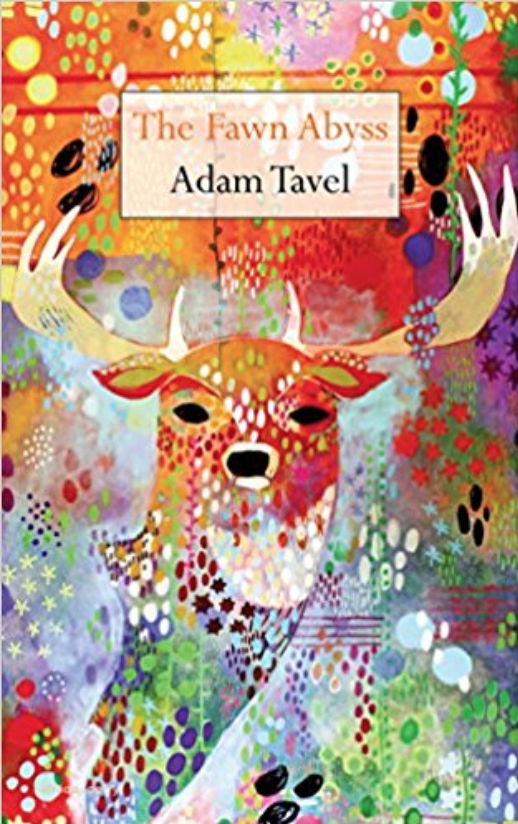ISSN: 1941-4137
POETRY THAT ENACTS THE ARTISTIC AND CREATIVE PURITY OF GLASS
POETRY THAT ENACTS THE ARTISTIC AND CREATIVE PURITY OF GLASS

Tanner Lee lives in Ogden, Utah. His writing has appeared or is forthcoming in Hobart, West Trade Review, Weber: The Contemporary West, The Comstock Review, and Entropy Mag. He is an assistant blog manager at The Blueshift Journal. Find him on twitter: @heytannerlee.
May 8, 2018
Edited by Stephanie Kaylor
Edited by Stephanie Kaylor
Review of The Fawn Abyss by Adam Tavel
 The Fawn Abyss
by Adam Tavel
Salmon Poetry, 2017
In his third collection, The Fawn Abyss (Salmon Poetry, 2017), Glass poet Adam Tavel ("Camp Loss") explores his fall from innocence into something ethereal, fleeting, and fragile. When he finds two dead deer on the side of the road, he searches for the person responsible. “I want to blame the trigger finger / of some callous hunter…” Throughout the collection, he searches for a culprit. Either god, circumstance, or the self are to blame. Tavel recounts an event from a 1915 Antarctic expedition where a man shoots a team of dogs in order to survive the cold. The men are stranded over 350 miles from the nearest shore in temperatures of 30 degrees below zero. “Hard to know when it dies inside a man, / the idea that suffering is / redemptive…” Tavel seeks to pinpoint the absurd: a person to blame for the gruesome death of a fawn and its mother, the reason a team of dogs had to die, and even the proper form of grief for Mary Todd Lincoln when she loses her son to typhoid fever. “How to know the culprits? Who’s to say / Even what belongs?"
He begins his collection with the haggard backdrop of the Chesapeake Bay. Grounded in US and familial heritage, Tavel writes with redemption just out of reach. In his hunt for a cause of violence, he can’t avoid confronting the divine.
Since failure like whiskey downed
at a wake churns raw, since
prayer is another cowboy pistoling
need into the sky…
The night his father’s heart fails, the narrator stumbles through the city back to a “backyard dew, the good moon / lighting my Hail Mary, my spiral / for imaginary hands.” Tavel reaches through generations of history and ancestry in search of a hidden solution to grief. Often, the human response to violence is to either reach outward to God or inward towards the self. Tavel juxtaposes his family’s religious traditions with his tendency to combat sorrow with attentiveness.
Just as Mary Todd Lincoln encourages Abe to reject his Christianity and participate in a seance to speak to their deceased son, Tavel seems to reject the Christian theme that suffering has a purpose. In the futile existence where all we have is “so much / poetry & terror which is / an accurate summary of our lives,” we must recognize the beautiful, cursory moments that instill in us a vague sense of purpose.
During Tavel’s interrogation of the absurd, he remembers a nightstand “where [his] wife’s fingerprints gloss / a bean-body and nubbin hands.” Among the violence, dysfunctional past, and divine inconsistencies, he clings to his family, poetry, and the Nile of our existence that is prone to flooding.
Visit Adam Tavel's Website
Visit Salmon Poetry's Website
The Fawn Abyss
by Adam Tavel
Salmon Poetry, 2017
In his third collection, The Fawn Abyss (Salmon Poetry, 2017), Glass poet Adam Tavel ("Camp Loss") explores his fall from innocence into something ethereal, fleeting, and fragile. When he finds two dead deer on the side of the road, he searches for the person responsible. “I want to blame the trigger finger / of some callous hunter…” Throughout the collection, he searches for a culprit. Either god, circumstance, or the self are to blame. Tavel recounts an event from a 1915 Antarctic expedition where a man shoots a team of dogs in order to survive the cold. The men are stranded over 350 miles from the nearest shore in temperatures of 30 degrees below zero. “Hard to know when it dies inside a man, / the idea that suffering is / redemptive…” Tavel seeks to pinpoint the absurd: a person to blame for the gruesome death of a fawn and its mother, the reason a team of dogs had to die, and even the proper form of grief for Mary Todd Lincoln when she loses her son to typhoid fever. “How to know the culprits? Who’s to say / Even what belongs?"
He begins his collection with the haggard backdrop of the Chesapeake Bay. Grounded in US and familial heritage, Tavel writes with redemption just out of reach. In his hunt for a cause of violence, he can’t avoid confronting the divine.
Since failure like whiskey downed
at a wake churns raw, since
prayer is another cowboy pistoling
need into the sky…
The night his father’s heart fails, the narrator stumbles through the city back to a “backyard dew, the good moon / lighting my Hail Mary, my spiral / for imaginary hands.” Tavel reaches through generations of history and ancestry in search of a hidden solution to grief. Often, the human response to violence is to either reach outward to God or inward towards the self. Tavel juxtaposes his family’s religious traditions with his tendency to combat sorrow with attentiveness.
Just as Mary Todd Lincoln encourages Abe to reject his Christianity and participate in a seance to speak to their deceased son, Tavel seems to reject the Christian theme that suffering has a purpose. In the futile existence where all we have is “so much / poetry & terror which is / an accurate summary of our lives,” we must recognize the beautiful, cursory moments that instill in us a vague sense of purpose.
During Tavel’s interrogation of the absurd, he remembers a nightstand “where [his] wife’s fingerprints gloss / a bean-body and nubbin hands.” Among the violence, dysfunctional past, and divine inconsistencies, he clings to his family, poetry, and the Nile of our existence that is prone to flooding.
Visit Adam Tavel's Website
Visit Salmon Poetry's Website
Glass: A Journal of Poetry is published monthly by Glass Poetry Press.
All contents © the author.
All contents © the author.





